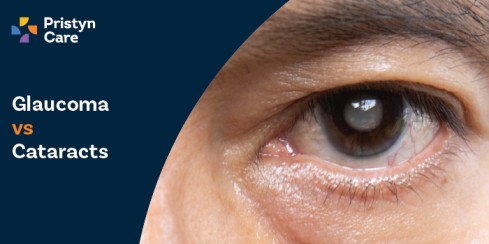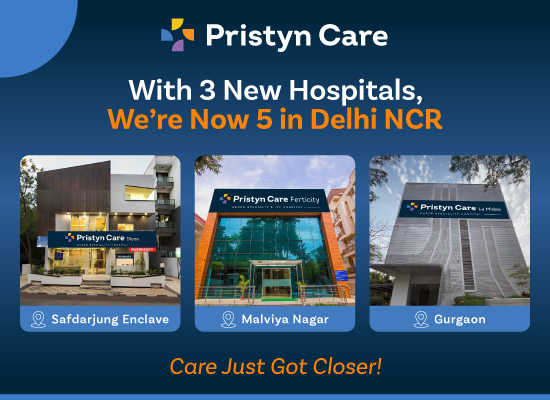![]() Views: 168
Views: 168
Early Signs and Symptoms Of Glaucoma
Glaucoma is a serious eye condition that can lead to blindness if not detected and managed early. It is a significant health concern in India. It is estimated that around 12 million Indians are affected by this condition, making it critical to understand and address it effectively.
Dedicated Support at Every Step!
Our Doctors are available 24 hours a day, 7 days a week to help you!
Call Us9513-316-643Table of Contents
Introduction
This blog aims to shed light on glaucoma, the early signs and symptoms of glaucoma, its causes, prevention strategies, and treatment options, including glaucoma surgery, as well as the importance of early detection.
Glaucoma is characterised by damage to the optic nerve that connects your eye to your brain. It is usually due to increased pressure within the eye. This can lead to gradual loss of vision if left untreated.
Glaucoma often exhibits no early symptoms, making it difficult for individuals to realise they have it until their vision is significantly impacted. Regular eye check-ups with the best ophthalmologist in your region can aid in early detection and management.
We will explore the causes of glaucoma, prevention methods, treatment options, success rates of glaucoma surgery, and recovery aspects in detail. This blog is not just to inform but also to reassure and empower you with knowledge so that you can take proactive steps towards maintaining your eye health. Let us delve deeper into understanding this condition.
No Cost EMI, Hassle-free Insurance Approval
Understanding Glaucoma
Glaucoma is a condition that threatens our vision. It is not a single disorder but rather a group of eye conditions resulting in optic nerve damage. It can lead to vision loss and, if left untreated, blindness.
The following are some common types of glaucoma:
- Open-angle Glaucoma: There are no obvious symptoms or warning signs in the early stages of this glaucoma. This type progresses slowly and painlessly without noticeable vision loss until the disease has significantly advanced.
- Angle-closure Glaucoma: This type is less common but can be more severe. Here, eye pressure rises rapidly resulting in sudden eye pain, headache, blurred vision, or even seeing halos around lights.
- Normal-tension Glaucoma: Optic nerve damage can occur even when eye pressure is within normal or low levels. The cause of normal-tension glaucoma is not fully understood, and it is also referred to as normal-pressure or low-tension glaucoma.
- Congenital Glaucoma: Some infants are born with improperly formed drainage canals, leading to congenital glaucoma. Symptoms may be identified by doctors at birth or become apparent during childhood. This type of glaucoma is also known as childhood, infantile, or paediatric glaucoma.
While discussing the causes of glaucoma, it is important to understand that intraocular pressure alone does not explain everything. It plays a significant role; however, other factors are also contributors.
Risk factors associated with glaucoma are varied. Being above 60 years of age or having a family history of glaucoma increases your risk. Other risk factors include high myopia (near-sightedness), diabetes, and hypertension.
It Is essential to remember that a visit to the best ophthalmologist for regular eye examinations can help detect the disease early before significant damage occurs. They can offer various treatment options, including medication, laser treatment, or even glaucoma surgery depending on the severity of your condition. The success rate of glaucoma surgery is quite promising.
Early Signs and Symptoms of Glaucoma
Glaucoma commonly has no significant signs or symptoms until the disease has advanced. However, in some cases, there are early warning signs which can help in prompt detection and treatment. Let us understand what these signs are.
- Gradual Loss of Peripheral Vision: Often one of the first symptoms of glaucoma is a slow loss of side (peripheral) vision. You may realise you are experiencing this when you find difficulty in seeing objects which are to your side while looking straight ahead.
- Blurred Vision: As glaucoma progresses, you might notice your vision becoming less clear or rather blurred. It is easy to mistake this sign for a need for eyeglasses or as a natural consequence of ageing.
- Seeing Halos Around Lights: Individuals with glaucoma frequently report seeing ‘halos’ around lights, especially at night. This could be due to higher pressure within the eye affecting light perception.
- Eye Pain and Redness: While not everyone experiences it, some people may feel pain in their eyes or may notice that their eyes turn red.
- Nausea and Vomiting: This could be accompanied by severe eye pain in certain cases of acute angle-closure glaucoma.
The above-mentioned symptoms are often subtle and challenging to recognise without regular eye check-ups. A consultation with the best ophthalmologist, along with appropriate and timely treatment options such as medication or even glaucoma surgery, can help in the prevention and effective management of the condition and increased rate of recovery.
The success rate of glaucoma surgery is quite encouraging; however, early detection remains the best defence against vision loss from glaucoma. If you notice any of the above symptoms, do not delay in scheduling an appointment with your eye doctor.
Differences in Symptoms Based on Type of Glaucoma
Glaucoma presents differing symptoms depending on whether it is open-angle or angle-closure glaucoma.
Open-angle glaucoma, the most common type, does not show immediate warning signs. Its onset is slow and gradual, often going unnoticed until significant vision loss occurs. Some typical symptoms you might experience include:
- Patchy blind spots in your peripheral (side) or central vision, often in both eyes
- Tunnel vision in advanced stages
On the other hand, angle-closure glaucoma is less common but presents more acute symptoms. It is considered a medical emergency requiring immediate attention from the best ophthalmologist. Symptoms can include:
- Severe headache
- Eye pain
- Nausea and vomiting
- Blurred vision
- Seeing halos around lights
Recognising these symptoms early is critical in determining the right treatment options. Glaucoma surgery has a high success rate and can greatly help with the recovery of vision or slowing down its loss.
Understanding the differences between these types of glaucoma is crucial to ensure prompt detection and treatment. If you notice any symptoms, do not hesitate to consult your doctor for proper diagnosis and early intervention.
MS, DNB, FICO, MRCS, Fellow Paediatric Opth and StrabismusMobile
FREEConsultation Fee
Diagnosing Glaucoma
Glaucoma is a complex eye disease that affects the optic nerve. It is one of the leading causes of blindness worldwide. Let us delve into how this condition is diagnosed and the possible treatment options.
Diagnosis begins with a comprehensive eye examination, which can be done by the best ophthalmologist in your area. The doctor will assess your medical history, including any familial history of glaucoma or other eye conditions. They will also conduct several tests, including:
- Tonometry: Measures the pressure within your eye.
- Ophthalmoscopy: Inspects the optic nerve for any damage.
- Perimetry (Visual Field Test): Checks for areas of vision loss.
- Gonioscopy: Examines the drainage angle.
If these tests indicate high intraocular pressure, damage to the optic nerve, or vision loss, a diagnosis of glaucoma is made. Once the causes of glaucoma are identified, it is crucial to start treatment promptly to prevent further damage. Treatment aims to lower intraocular pressure and can be achieved through medications, laser treatment, or glaucoma surgery.
Medications are typically the first option explored. They come in the form of eye drops or pills, and they work by either reducing fluid production in the eye or by helping fluid drain from the eye.
Laser treatment is generally considered when medications are not effective. A focused beam of light reshapes the drainage system of the eye, improving fluid outflow and thereby decreasing intraocular pressure.
Surgery is often the last resort when both medications and laser treatments fail to control intraocular pressure. Glaucoma surgery creates a new pathway for fluid to exit the eye. The most common types include:
- Trabeculectomy: A small piece of tissue is removed to allow fluid to drain out of the eye.
- Tube shunt surgery: A small tube is inserted to allow fluid to drain from the eye.
- Micro-invasive glaucoma surgery: A newer, less invasive procedure that uses tiny devices to increase fluid drainage.
The success rate of glaucoma surgery is high, and recovery generally involves regular follow-ups and eye drops for a few weeks. Prevention is always better than cure. Regular eye check-ups can help detect glaucoma early before significant damage occurs. So never ignore any vision-related issues; consult the best ophthalmologist immediately.
Why Early Detection Matters
Glaucoma is a condition that often leads to blindness if not treated in time. The root causes of glaucoma are not fully understood, but it is known that early detection and treatment can prevent vision loss. Here's why early detection matters:
- Prevention of Vision Loss: Glaucoma damages the optic nerve. This damage is irreversible and can lead to permanent blindness. However, if detected early, treatment options including medication or glaucoma surgery can halt further damage.
- Avoiding Complications: Untreated glaucoma can lead to other serious complications such as tunnel vision, severe headaches, eye pain, blurred vision, and even complete vision loss.
- Better Treatment Outcomes: Early detection means you can start treatment sooner. This not only slows the progression of the disease but also improves the success rate of treatments.
- Higher Recovery Rates: When detected early, the recovery after glaucoma surgery is quicker and more successful.
- Lower Healthcare Costs: Diagnosing and treating glaucoma in its initial stages can significantly reduce overall healthcare costs associated with advanced treatments and surgeries.
Recognising early signs of glaucoma is crucial for its management. Regular eye exams not only help check your vision but also test for various eye diseases, including glaucoma. The best ophthalmologist in your area will guide you regarding potential risks and help you understand the importance of regular check-ups.
Conclusion
Glaucoma is a severe eye condition that can lead to irreversible blindness if not diagnosed and treated on time. Some major causes of glaucoma include significantly heightened intraocular pressure, age, hereditary factors, and certain chronic diseases like diabetes. Recognising the symptoms early is the key to effective treatment options and prevention of further damage.
If you experience symptoms such as vision loss, redness in the eye, seeing halos around lights, or severe eye pain, do not hesitate to consult a doctor immediately. Even if you are not experiencing any discomfort or unusual symptoms, regular eye check-ups with the best ophthalmologist can aid in early detection and prevention.
The treatment options available range from prescription eye drops to surgical interventions like glaucoma surgery. The success rate of glaucoma surgery is high, often leading to significant improvement in vision and quality of life post-surgery. Despite the high success rates, the recovery period post-surgery is crucial and requires strict adherence to medication schedules and follow-up visits.
By taking proactive steps towards eye health, not only can we prevent serious conditions like glaucoma but also ensure our overall well-being. Remember, your eyes are an important part of your health; don't neglect them.
References
- https://www.ncbi.nlm.nih.gov/pmc/articles/PMC7380776/
- https://www.ncbi.nlm.nih.gov/pmc/articles/PMC10229968/
- https://www.aao.org/eye-health/diseases/what-is-glaucoma
- https://my.clevelandclinic.org/health/diseases/4212-glaucoma
- https://www.medicalnewstoday.com/articles/9710#surgery












